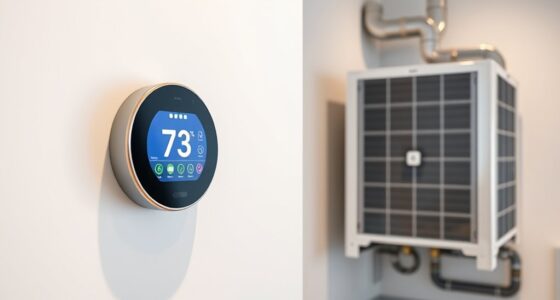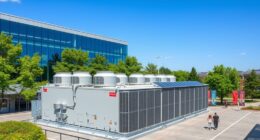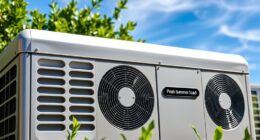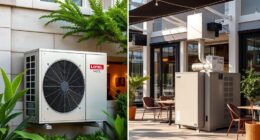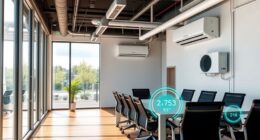Prepare to discover the hidden treasures of HVAC heat pumps! In this article, we, your reliable experts, will unveil the efficiency tips that will transform your heating and cooling system.
By exploring the crucial role of proper insulation, optimizing airflow, selecting the right size, and maintaining your heat pump, we will empower you with the knowledge to achieve maximum efficiency.
Get ready to liberate your HVAC system and embrace a new era of comfort and cost savings.
Key Takeaways
- Proper insulation and weatherization are essential for maximizing HVAC heat pump efficiency.
- Regular maintenance, including filter cleaning and coil inspection, ensures optimal performance and longevity.
- Correctly sized and designed ductwork is crucial for balanced airflow and efficient operation.
- Advanced technologies such as smart controls and variable speed compressors can enhance heat pump efficiency and performance.
The Role of Proper Insulation in HVAC Heat Pump Efficiency
Why is proper insulation important for maximizing the efficiency of our HVAC heat pumps?
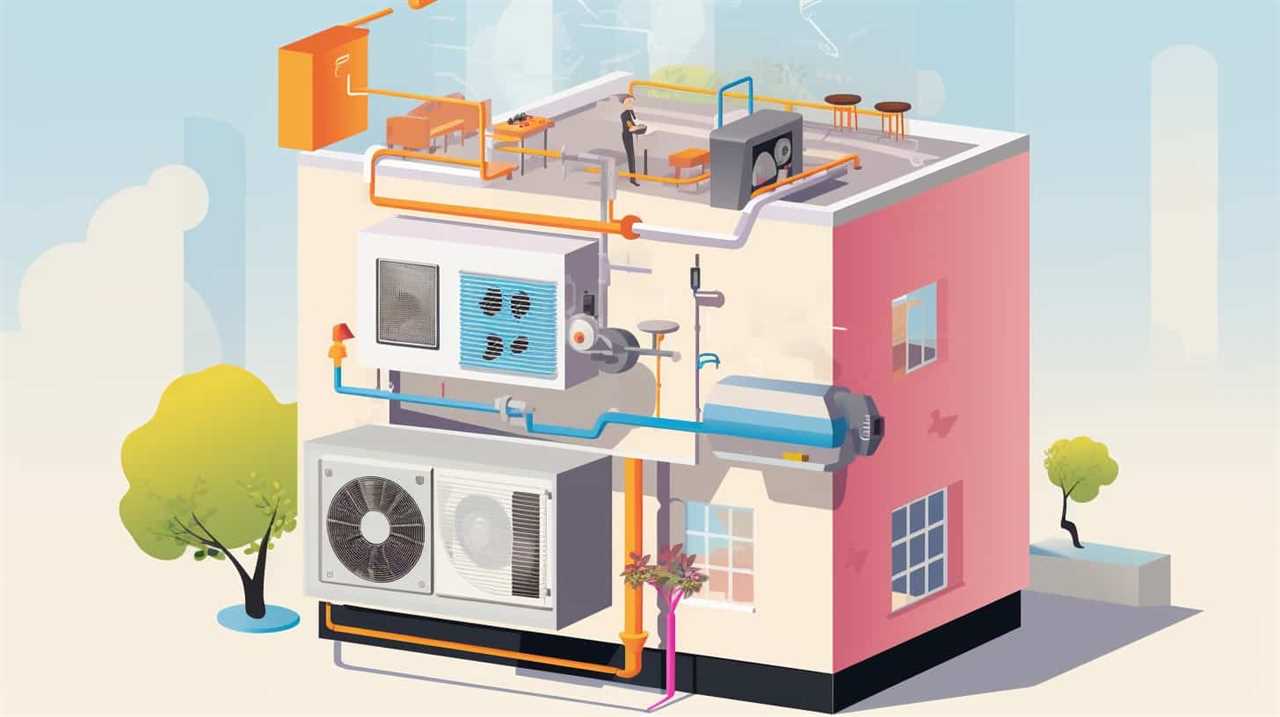
The role of weatherization in HVAC heat pump efficiency can’t be overstated. Proper insulation plays a crucial role in maintaining the desired indoor temperature while minimizing energy loss. Without adequate insulation, heat pumps must work harder to compensate for the escaped heat or cool air, resulting in reduced efficiency and increased energy consumption.
Additionally, the impact of ductwork on heat pump performance shouldn’t be overlooked. Leaky or poorly insulated ducts can lead to significant energy losses, compromising the overall efficiency of the system.
Optimizing Airflow for Enhanced HVAC Heat Pump Performance
To maximize the performance of our HVAC heat pumps, we need to optimize airflow for enhanced efficiency. Proper airflow management is crucial in achieving optimal heat pump operation and energy utilization. Here are three key strategies for heat pump optimization through airflow management:
Duct design and sizing: Ensure that the ductwork is correctly sized and designed to deliver the required airflow to each room. Improperly sized ducts can lead to air pressure imbalances and reduced system performance.
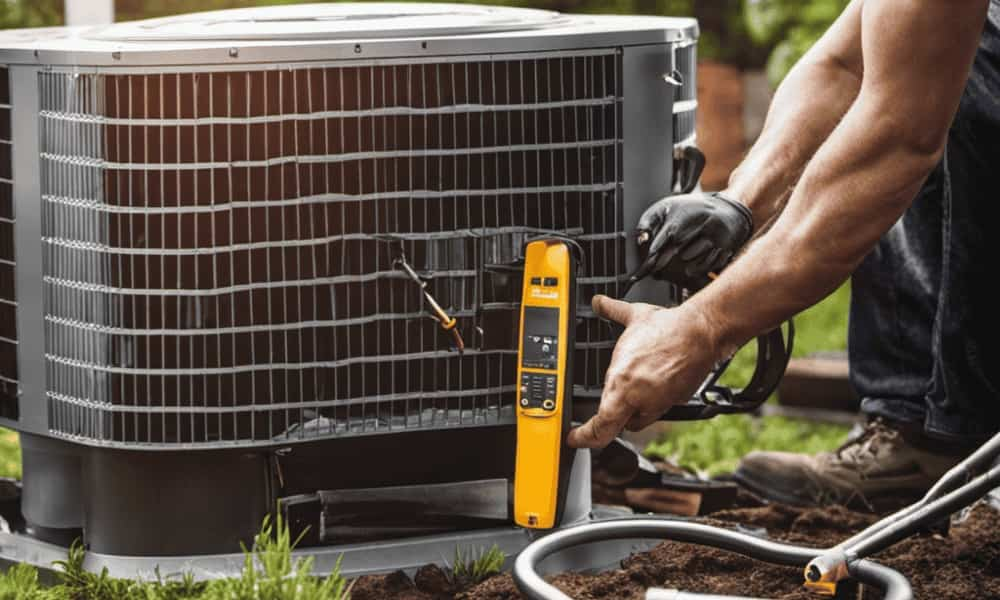
Regular filter maintenance: Clean or replace air filters regularly to prevent clogging and airflow restrictions. Restricted airflow can strain the heat pump, leading to decreased efficiency and increased energy consumption.
Airflow balancing: Balance the supply and return airflow throughout the system to maintain proper air distribution. Uneven airflow can result in hot or cold spots, reducing comfort and wasting energy.
Selecting the Right Size Heat Pump for Maximum Efficiency
We need to ensure that we select the right size heat pump for maximum efficiency. Sizing considerations play a crucial role in determining the energy consumption and overall performance of a heat pump.
Oversized heat pumps may lead to short cycling, where the unit turns on and off frequently, resulting in higher energy consumption and reduced efficiency.
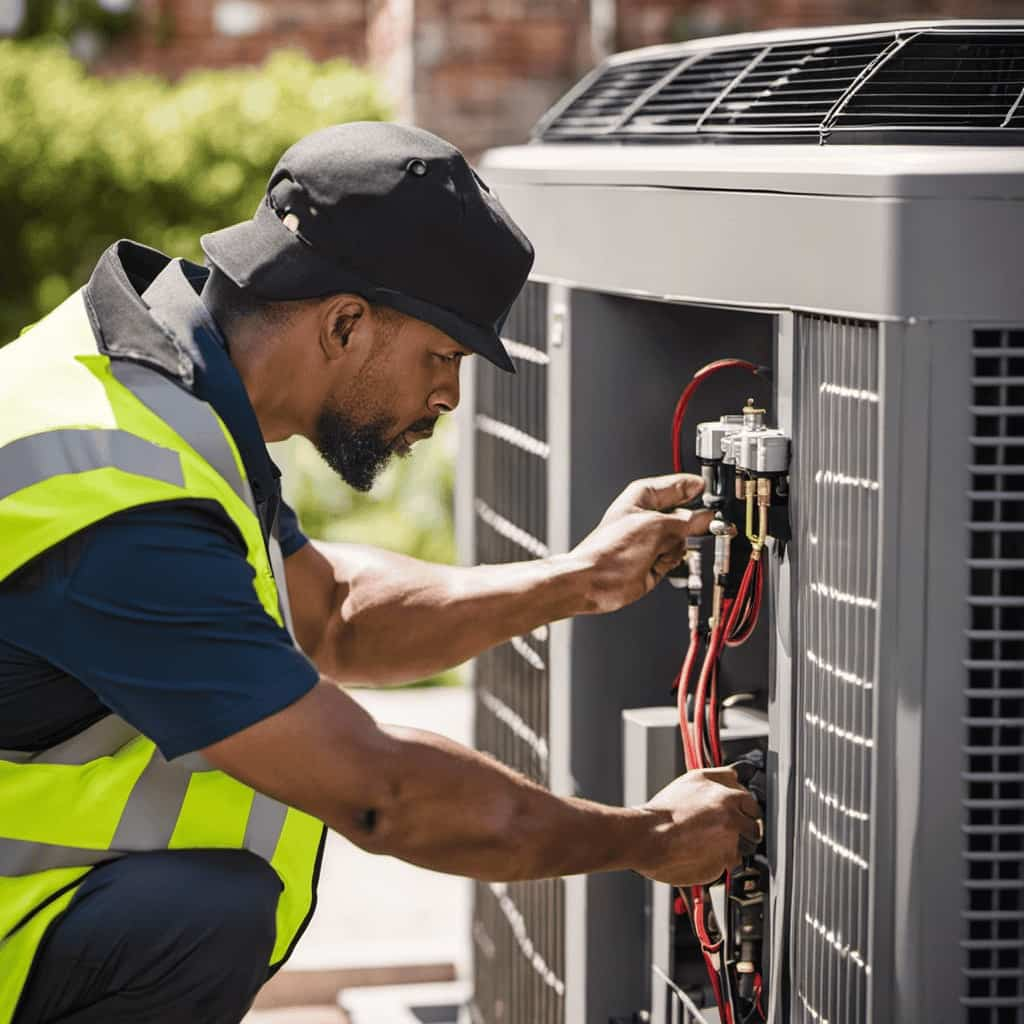
On the other hand, undersized heat pumps may struggle to meet the heating or cooling demands of the space, leading to increased energy usage and discomfort.
To select the right size heat pump, it’s important to consider factors such as the size and insulation of the space, climate conditions, and the heat pump’s heating and cooling capacity.
Conducting a thorough load calculation is essential to accurately determine the appropriate size of the heat pump for optimal efficiency.
The Importance of Regular HVAC Heat Pump Maintenance
Regular HVAC heat pump maintenance is essential for optimal performance and longevity. To ensure your heat pump operates at its best, it’s important to follow a regular maintenance checklist:

Cleaning the Filters: Dirty filters can restrict airflow and reduce efficiency. Regularly clean or replace filters to maintain optimal airflow.
Inspecting and Cleaning the Coils: Over time, coils can accumulate dirt and debris, hindering heat transfer. Regularly inspect and clean the coils to improve efficiency.
Checking Refrigerant Levels: Proper refrigerant levels are crucial for the heat pump’s performance. Regularly check and adjust refrigerant levels as needed.
By following these maintenance tasks, you can keep your heat pump operating efficiently and extend its lifespan.
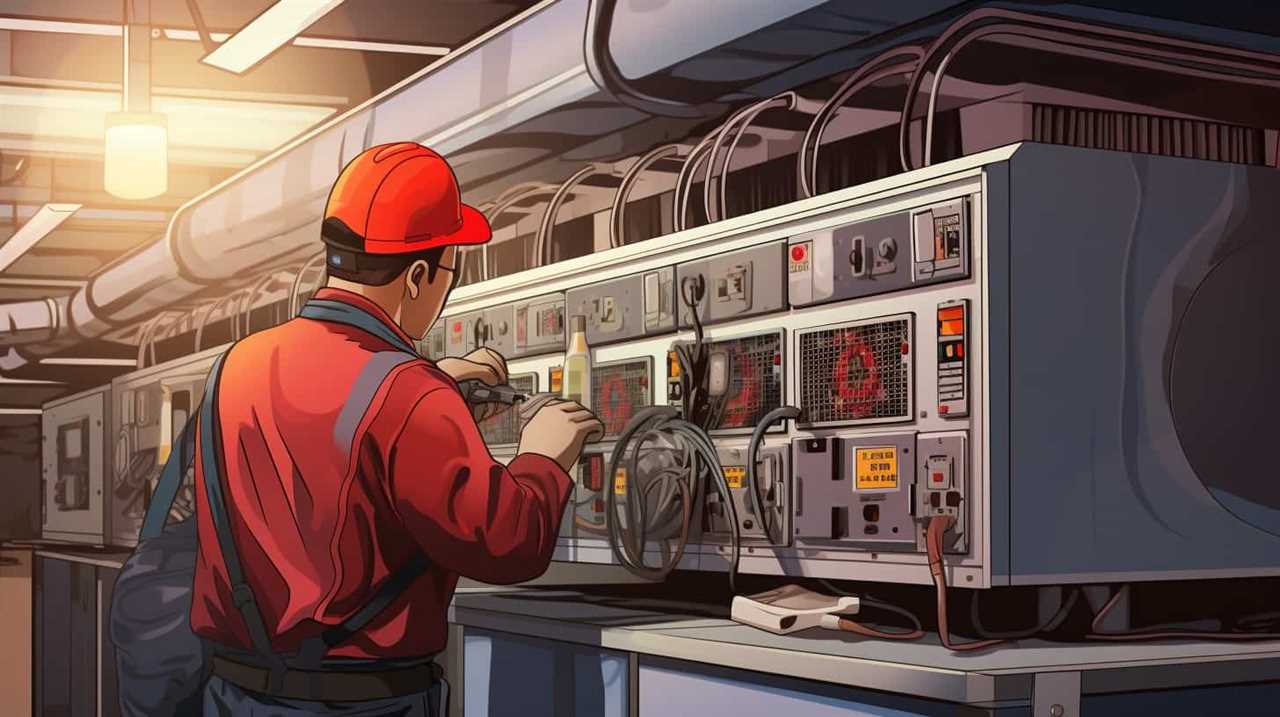
Now, let’s explore the advanced technologies for boosting HVAC heat pump efficiency.
Transition Sentence: Now that we understand the importance of regular maintenance, let’s delve into the advanced technologies that can further enhance the efficiency of HVAC heat pumps.
Advanced Technologies for Boosting HVAC Heat Pump Efficiency
Now, let’s explore how advanced technologies can enhance the efficiency of HVAC heat pumps.
One of the key advancements in boosting efficiency is the use of smart controls. These innovative systems utilize advanced algorithms and sensors to optimize the operation of heat pumps based on real-time conditions. By continuously monitoring factors such as indoor and outdoor temperatures, occupancy, and weather forecasts, smart controls can adjust the heat pump’s settings to maximize efficiency without sacrificing comfort.
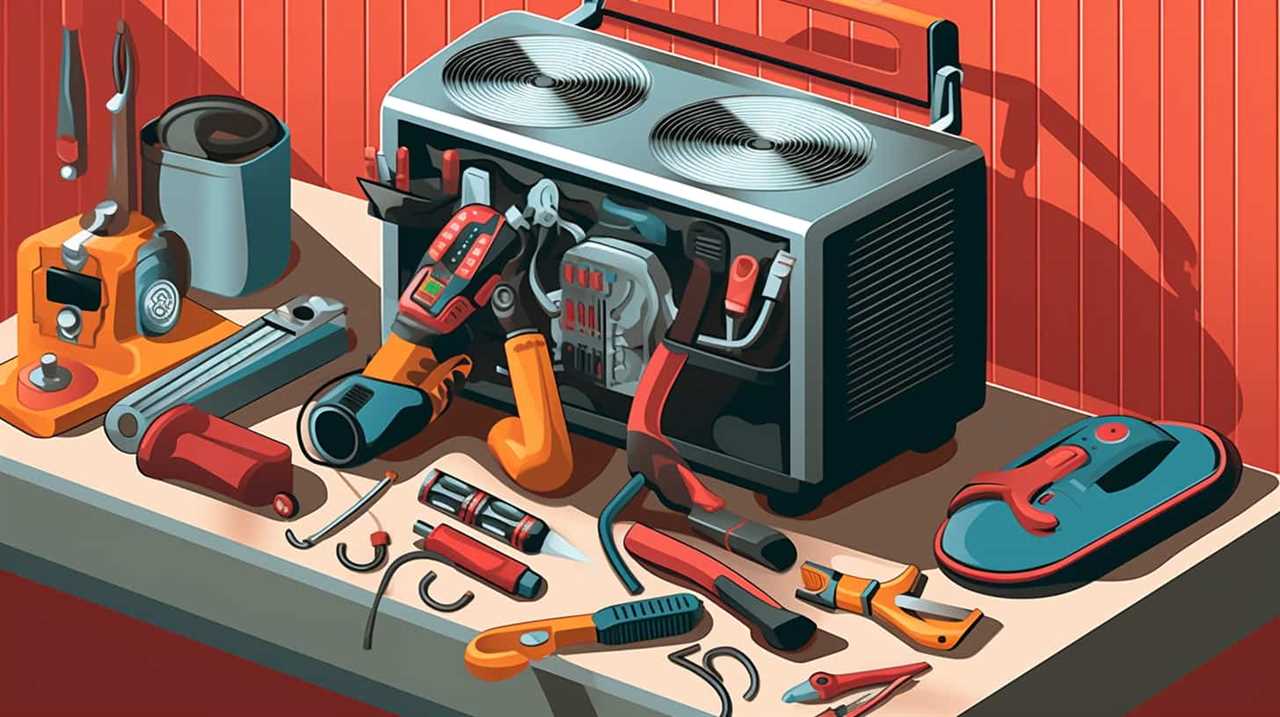
Another technology that can significantly improve HVAC heat pump efficiency is geothermal systems. These systems harness the stable underground temperature to provide heating and cooling, reducing the energy consumption of the heat pump. Geothermal systems also have the added benefit of being environmentally friendly, as they produce fewer greenhouse gas emissions compared to traditional HVAC systems.
Frequently Asked Questions
Can I Install an HVAC Heat Pump Without Proper Insulation and Still Expect It to Operate Efficiently?
Installing an HVAC heat pump without proper insulation can significantly impact its efficiency. Improper insulation can lead to energy consumption, airflow optimization, and size selection issues. Regular maintenance and the use of advanced technologies can enhance efficiency.
How Can I Improve the Airflow in My HVAC Heat Pump System to Enhance Its Performance?
To enhance our HVAC heat pump system’s performance, we must optimize fan speed and improve air circulation. These steps are crucial in achieving maximum efficiency and ensuring the liberation of our system’s full potential.
What Factors Should I Consider When Selecting the Right Size Heat Pump for My Home to Ensure Maximum Efficiency?
When selecting the right size heat pump for our home, we must consider factors like the square footage, insulation, and climate. Ensuring maximum efficiency requires finding the balance between capacity and energy consumption.
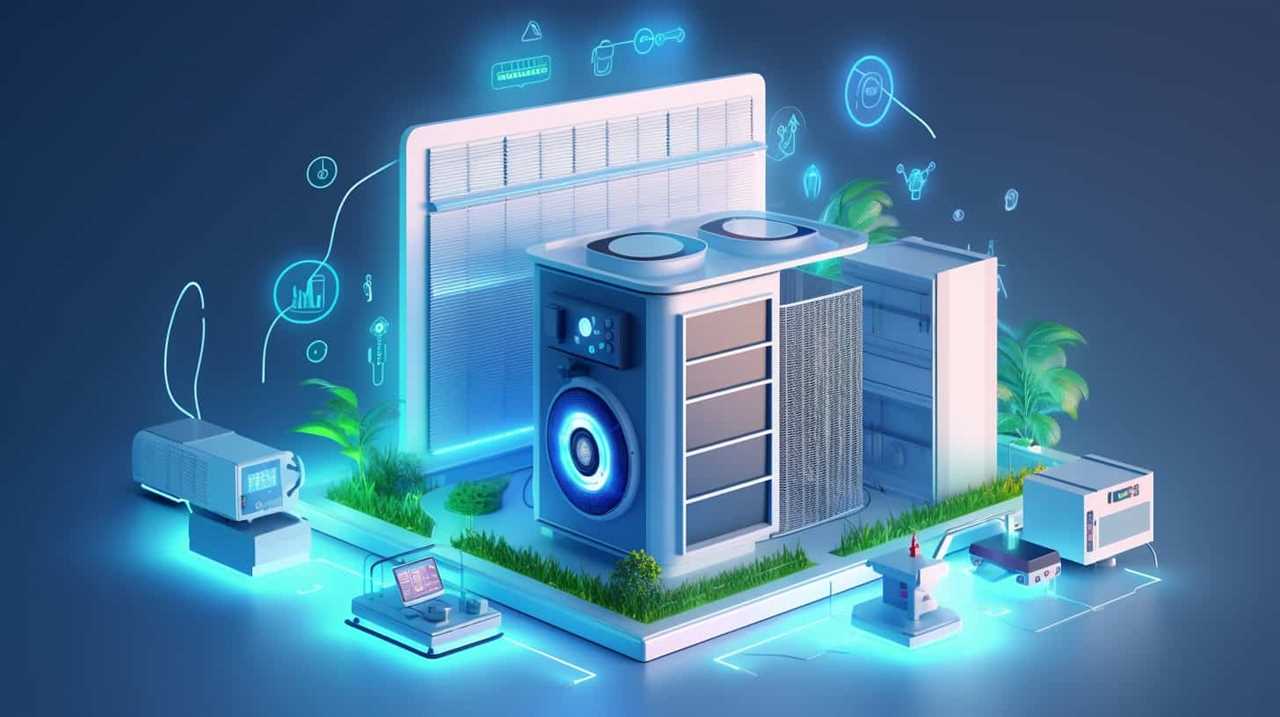
Is Regular Maintenance Necessary for HVAC Heat Pump Efficiency, and if So, How Often Should It Be Done?
Regular maintenance is crucial for HVAC heat pump efficiency. Neglecting it can significantly impact performance. To ensure longevity, we recommend scheduling maintenance regularly. Don’t underestimate the importance of this vital step in optimizing your system.
Are There Any Advanced Technologies Available That Can Further Boost the Efficiency of HVAC Heat Pumps, and How Do They Work?
Yes, there are advanced technologies available that can further boost the efficiency of HVAC heat pumps. These technologies work by optimizing energy usage, improving heat transfer, and incorporating smart controls for optimal performance.
What Are Some Insider Secrets to Maximize the Efficiency of Heat Pumps in HVAC Systems?
Maximizing heat pump efficiency secrets can significantly improve the performance of HVAC systems. Regular maintenance, such as cleaning or replacing air filters, ensures unrestricted airflow and optimal heat transfer. Properly insulating ductwork and sealing gaps reduce energy loss. Setting the thermostat at an appropriate temperature and using programmable features can avoid unnecessary energy consumption. Moreover, scheduling professional check-ups and considering upgrades or eco-friendly refrigerants can further enhance heat pump efficiency.
Conclusion
In conclusion, the efficiency secrets of HVAC heat pumps lie in proper insulation, optimized airflow, selecting the right size heat pump, regular maintenance, and advanced technologies.
These factors work together to enhance performance and maximize efficiency. Just like a well-oiled machine, a well-maintained HVAC heat pump operates smoothly and effectively, providing optimal heating and cooling while minimizing energy consumption.
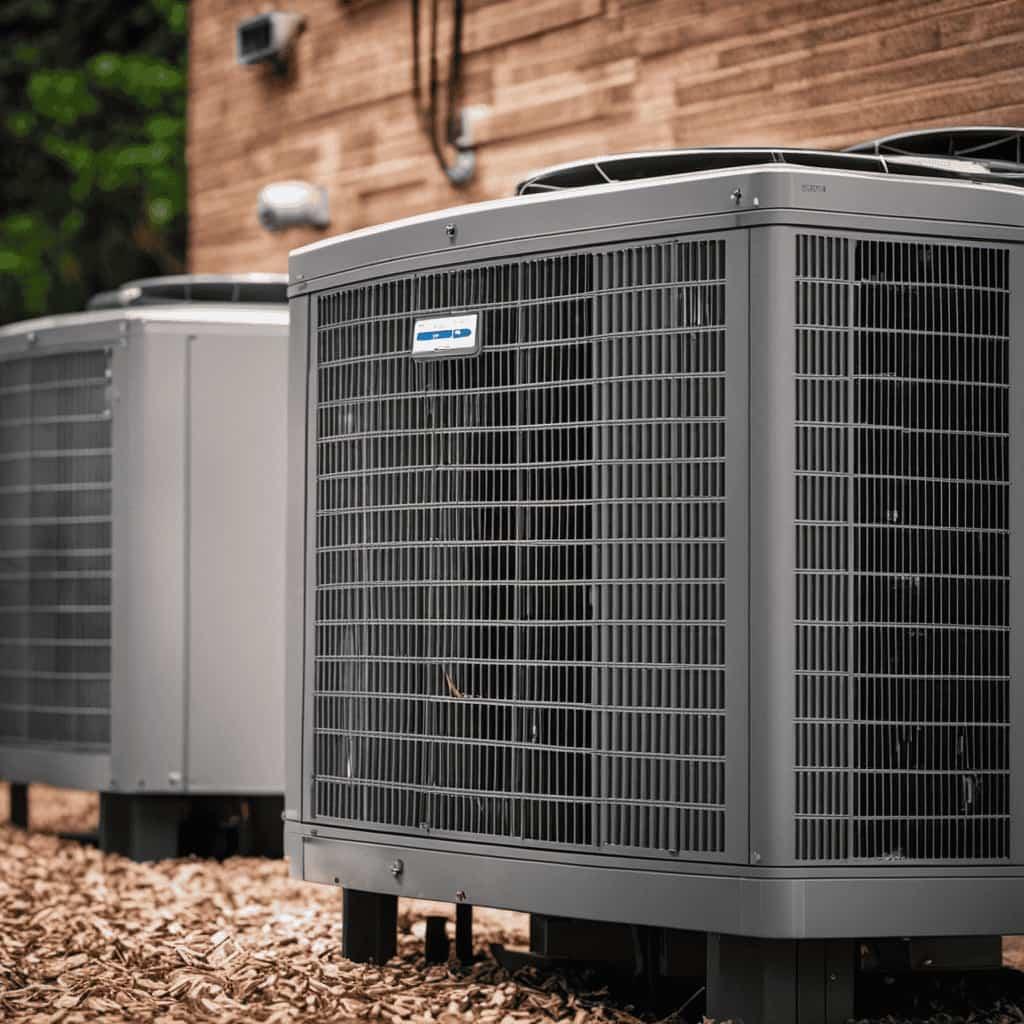
It’s like having a sleek, high-performance sports car that effortlessly glides through any climate.



